36+ Sample Self Evaluations
-
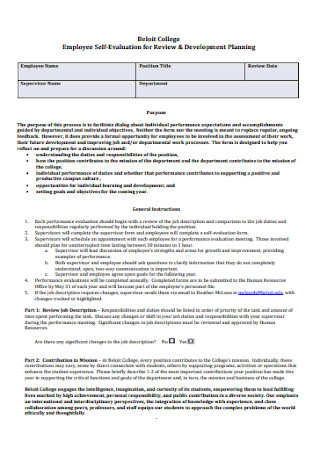
Employee Self Evaluation
download now -
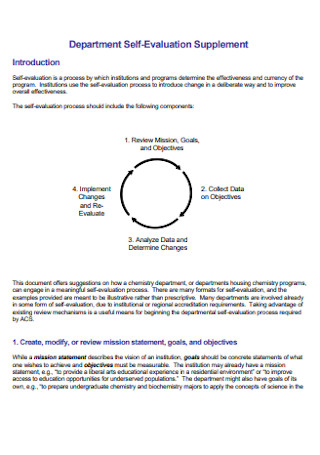
Department Self-Evaluation Supplement
download now -
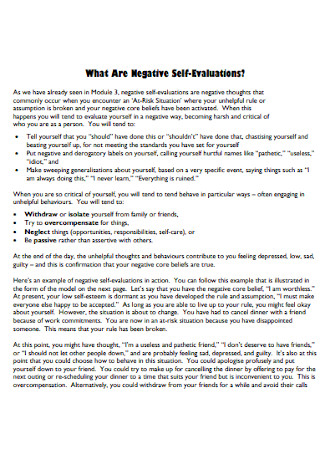
Negative Self-Evaluations
download now -
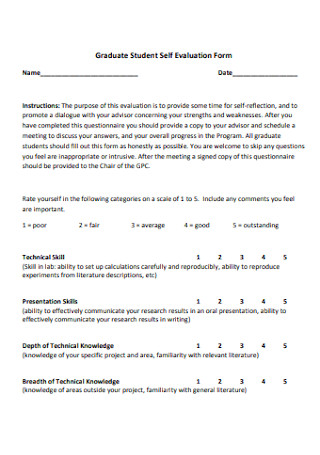
Graduate Student Self Evaluation Form
download now -
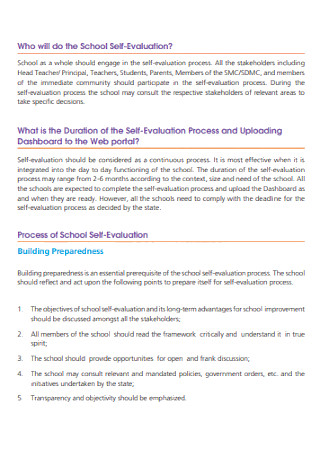
School Self-Evaluation
download now -
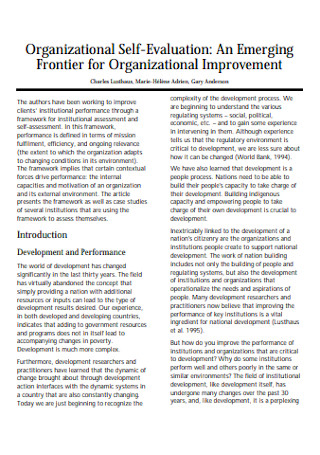
Organizational Self-Evaluation
download now -
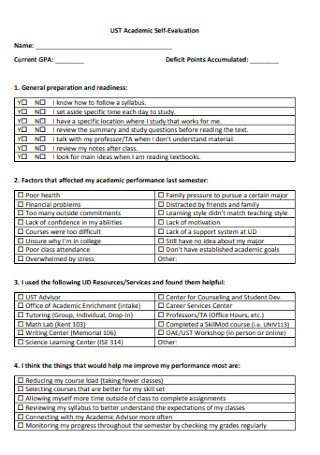
Academic Self-Evaluation
download now -
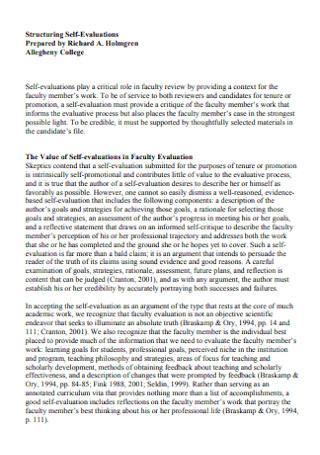
Structuring Self-Evaluations
download now -
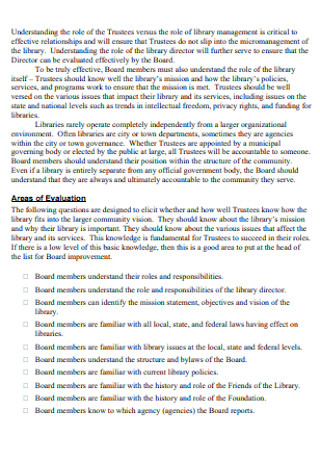
Library Board Self Evaluation
download now -
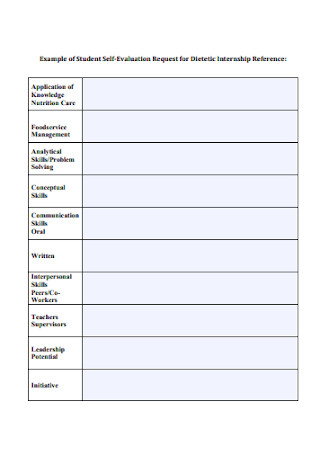
Student Self-Evaluation
download now -
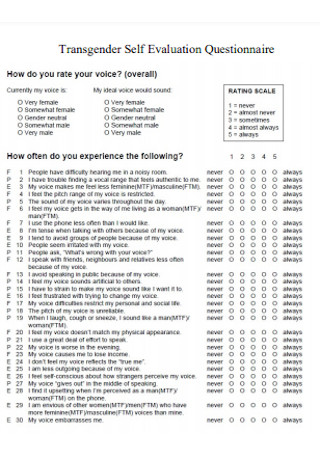
Transgender Self Evaluation Questionnaire
download now -
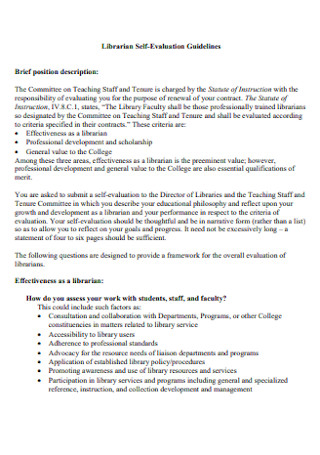
Librarian Self-Evaluation
download now -
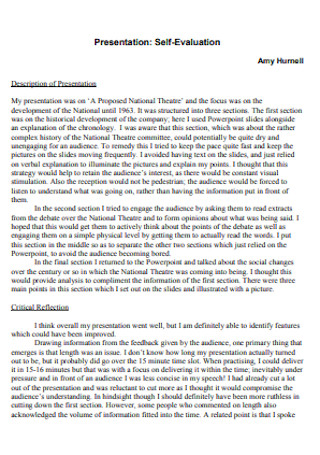
Presentation Self Evaluation
download now -
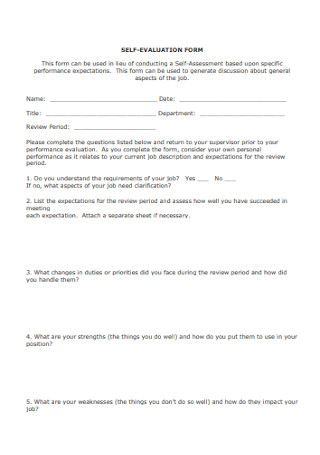
Simple Self Evaluation Form
download now -
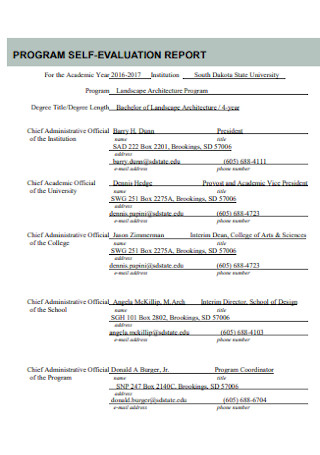
Self Evaluation Report
download now -
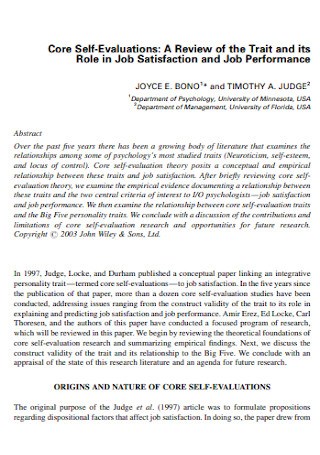
Core Self Evaluation Format
download now -
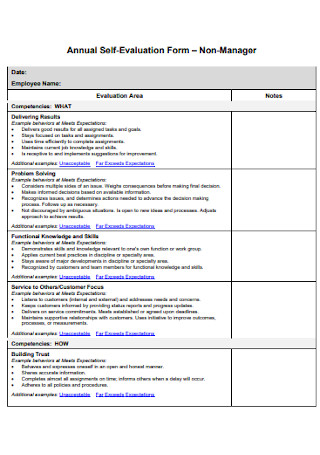
Annual Self-Evaluation Form
download now -
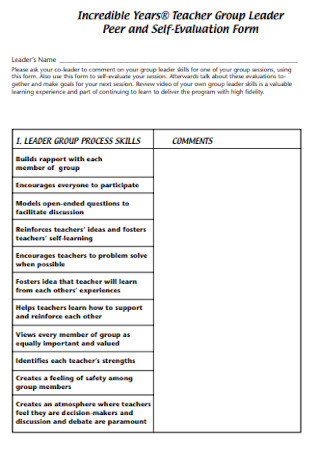
Peer and Self Evaluation Form
download now -
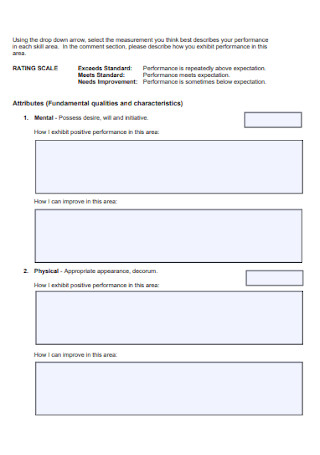
Employee Self Evaluation Form
download now -
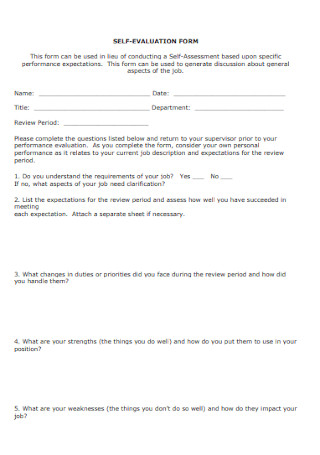
Sample Self Evaluation Form
download now -
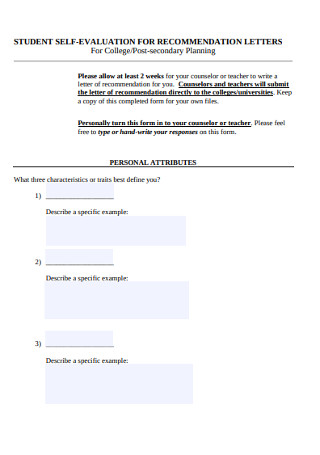
Student Self Evaluation Letter
download now -
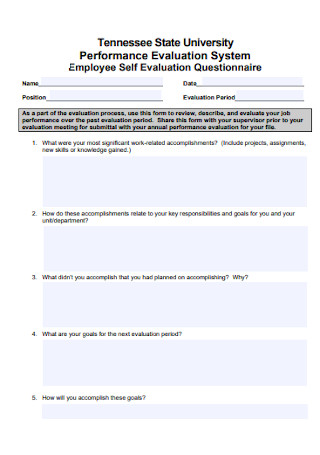
Employee Self Evaluation Questionnaire
download now -
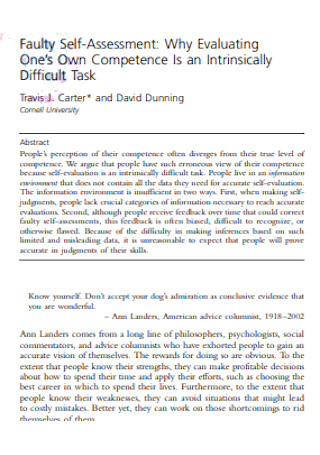
Faulty Self-Evaluation
download now -
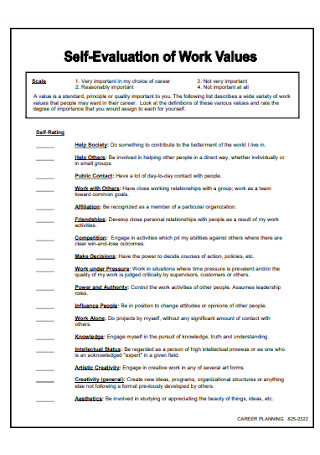
Self Evaluation of Work Values
download now -
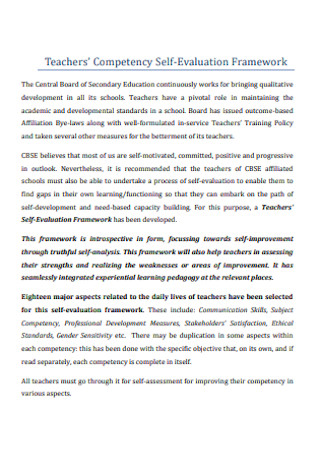
Teachers Competency Self-Evaluation
download now -
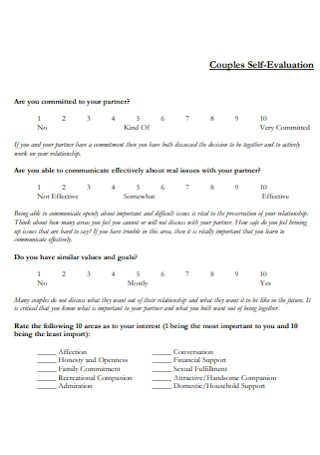
Couples Self-Evaluation
download now -
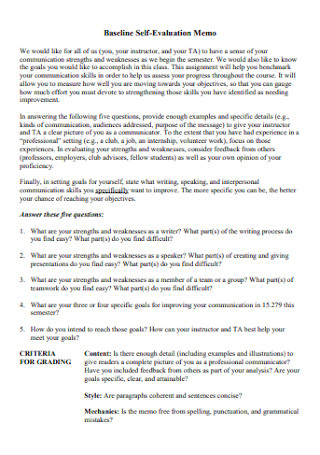
Baseline Self-Evaluation Memo
download now -
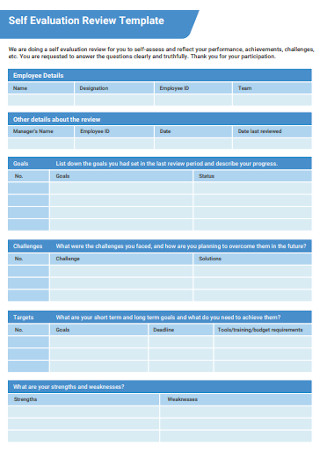
Self Evaluation Review Template
download now -
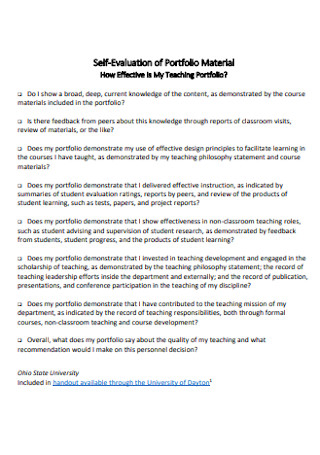
Self-Evaluation of Portfolio Material
download now -
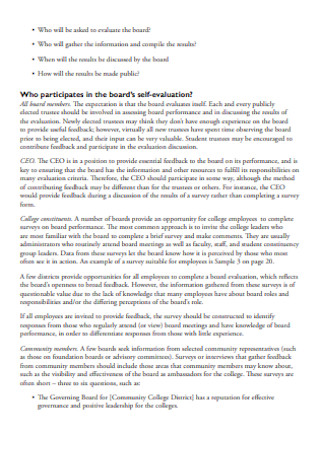
Boards of Trustees Self-Evaluation
download now -
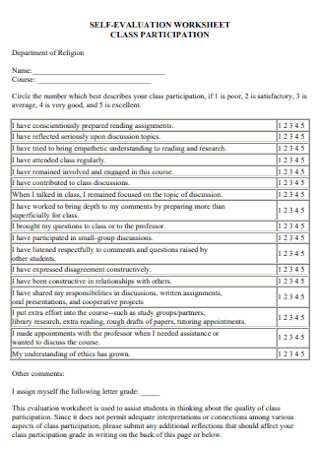
Self Evaluation Worksheet
download now -
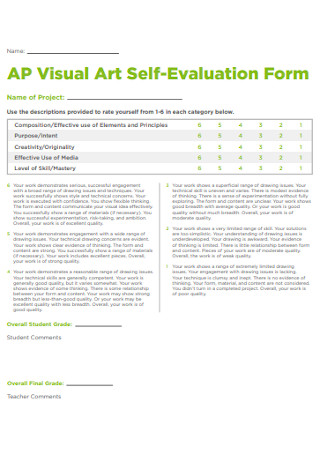
Visual Art Self-Evaluation Form
download now -
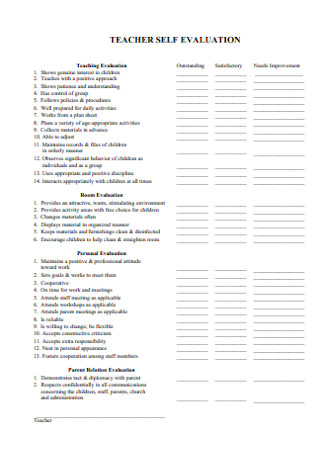
Teacher Self Evaluation
download now -
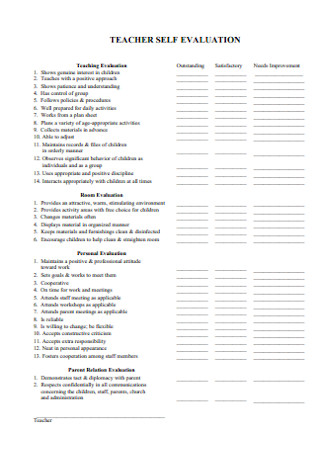
Speech Self Evaluation Form
download now -
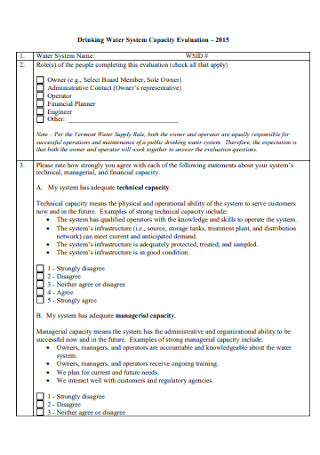
Water System Capacity Self Evaluation
download now -
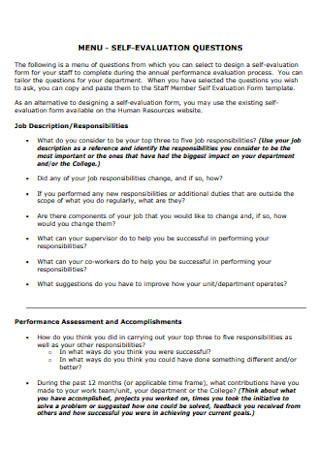
Evaluation Questions Template
download now -
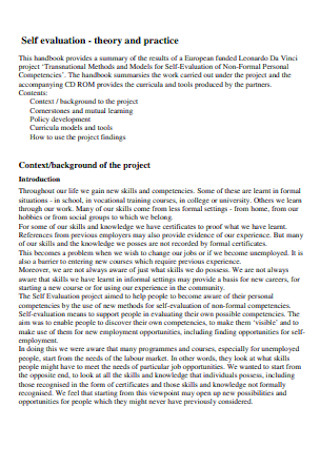
Self Evaluation Format
download now
FREE Self Evaluations s to Download
36+ Sample Self Evaluations
What Are Self Evaluations?
Self Evaluations Do’s and Don’ts
How to Write a Self Evaluation
Advantages of Self Evaluations
FAQs
Are self-evaluations or self-appraisals mandatory?
What should be included in the self-evaluation forms if roles changed within the evaluation cycle?
What does an evaluation cycle mean?
Will employers or managers provide the self-evaluation forms?
Are all employees, old and new, required to submit a self-evaluation form?
You’re more likely to have more confidence, have stronger relationships, and make better decisions if you have a higher level of awareness. Being self-aware is beneficial not only to you as an individual, but also to your company. Are you looking for templates that you can use for self-evaluations? Then you came to the right place, scroll down below to understand self evaluations and to download our printable and editable templates for FREE!
What Are Self Evaluations?
Self-evaluation performance review is an important tool not just for managers, but for the employees as well. Through self-evaluations, employees are made aware of their areas for improvement and which of their best practices should they maintain. It’s a good avenue to assess where employees have grown professionally and determine the rooms for improvement.
An effective self-evaluation tool contains a thoughtful, written review of employee performance during the evaluation cycle. Its questions must be focused on employee’s strengths and weaknesses by highlighting their accomplishments and best practices as well as room for improvement. It involves rating themselves based on established goals, competencies, and overall performance.
Self Evaluations Do’s and Don’ts
Writing a self-evaluation does not have to be a dreaded chore. Self-assessments could come as easy as searching for “self-review examples” on the internet. Here are some pointers that you need to consider when writing your own employee self-evaluation.
How to Write a Self Evaluation
A self-review is only effective when employees are given the proper and correct guidelines on how to accomplish the self-evaluation forms as well as the review process. Having the correct guidelines will help them find and organize the information that they need for their work performance review. On the other hand, a poorly executed self-evaluation can leave them feeling confused, dejected, and unengaged.
As the manager, remember it is your job to create a self-evaluation form that your subordinates can easily understand and answer. Here are five easy steps to keep in mind during the creation of a self-performance review.
Step 1: Know How the Self Evaluation is going to be Used
Whether you’re the manager or the employee doing the self-assessment, it is helpful to know its purpose. Ask the right people–the boss or the human resources what it will be used for and what are being considered based on the self-evaluation results. It should also be clarified how in-depth the evaluation should be and what are its inclusions. Knowing and understanding the purpose of the evaluation should give you a strong starting point on how the review should be written and set a certain expectation of the answers for it to be meaningful and actionable.
At the onset of the evaluation, managers should clarify the parameters of the evaluation and not rush them into writing one. This will make sure that the information they write on the form is true and what are essentials. Employees should be given enough time to accomplish the evaluation form. But managers must also set a deadline for it to avoid delays.
Step 2: Review the Job Description
Employees are most likely unsure of how self-evaluation works, so managers should coach about it. Revisiting their job description is a good place to start. This will help team leads and members recall their duties and responsibilities as well as help them identify areas they excelled in, skills they have developed and enhanced, and job functions that they need to improve on and do better.
This is especially important to employees who are interested in earning a promotion and they can find it helpful to review their job description so that they can juxtapose their performance vis-a-vis their role. It will help them determine if they are qualified for the promotion or a raise and if they are not, they can assess how they can build the required skills and experience to move up.
Step 3: Focus on achievements and room for growth
A section on where employees can reflect on their work performance and highlight their achievements at work. All involved parties in the self-evaluation should use the STAR method to demonstrate the impact of their work. Employees doing the self-evaluation should describe the Situation and Task, the Actions that were taken to complete it, and the Results or outcomes of their actions.
It is a simple framework structures self-assessment in a way that shows exceptional and commendable work and identifies actions that need to be improved. The STAR method also keeps the self-evaluation review objective and substantiated with data, facts, and figures to support employee improvement.
Step 4: Always Relate to the Objectives
Employees must be able to communicate their value to the company through self-evaluation and be able to demonstrate and report how their efforts and achievements have contributed to the company objectives. At the onset, managers and employees should be clear of the purpose and be aligned with their goals in mind.
This is an opportunity for employees to lay out their personal goals and determine how they are aligned with the company mission, vision, goals, and values towards their own personal and professional development.
Step 5: Define the Professional Development or Career Plan
While the majority of the self review is focused on looking back and reflecting on past performance, it’s also a great opportunity to set goals and intentions for the future.
After identifying strengths and weaknesses, there should be a section on goal-setting and guidance for the employees for their own professional growth. These goals should be specific and measurable, and set within a realistic timeframe.
Managers should also willingly provide input and guidance to employees so they can reach their full potential. This is also an opportunity for employees to ask for the support tools that the company can offer such as send you to conferences to further your knowledge and expertise or attend a certification training or seminar to advance your career.
Advantages of Self Evaluations
Self-evaluations, also known as self-performance reviews, are used to identify the strengths and weaknesses of an employee and can be used as a point of reference for managers when doing appraisals. Generally, these reviews cover specific areas over a specific period–may be quarterly or annually. Self-evaluations have multiple advantages for both employees and employers:
Avenue to Demonstrate Employee Accomplishments
It is important to employees that they have the opportunity to share their personal achievements at work that they are really proud of. It can be on how they handled a difficult project, completing a challenging task, or how they helped a teammate or colleague meet their goals and objectives. It helps employees feel recognized and heard for the work that they do and it gives them insights into the type of work that they love doing and feel most fulfilling.
Keeping track of employees’ strengths and achievements
Managers who oversee multiple employees cannot necessarily keep tabs on each of their achievements and accomplishments. There are times when leaders are not aware of each of their team members’ contributions to their team’s success. Furthermore, it can be challenging to remember each individual’s accomplishments especially those that transpired several weeks or months ago. Employees’ self-evaluation answers will help managers be reminded of their contributions and accomplishments and be aware of their strengths and the value they add to the team and organization as a whole.
Serves as a Motivational Tool for Employees
Having employees answer self-evaluation questions can help them introspect and reflect on the work that they have done over a specific timeframe. As a result, they become more aware of their successes and setbacks as well as which areas they need to improve on. Furthermore, a time for reflection can help employees find new or existing ways to build their skills, maintain their strengths and efforts to complete a specific task. Through self-evaluation, employees may be able to discover new or existing talents that they have or recognize their lack of skill and expertise to complete certain tasks. It’s also an opportunity for employees to find inefficiencies in their work processes and free up bottlenecks that contribute to them thus maximizing their efficiency.
Objective Reference for Compensation Appraisal
Employee self-evaluation helps in quantifying the value of the work that the employee offers. Their answers to self-evaluation forms help management determine if employees need to deliver more positive outcomes or deserve recognition. It’s also an excellent time for leaders to reassess their employees’ compensation and career development–determine whether the employee deserves a raise and/or a promotion based on the quality of work they’ve shown.
Self-evaluations allow employees to identify and verbalize the value they add to the organization and if they have demonstrated the needed and required skills from them to take on new tasks and responsibilities. Discussing with the employee the answers to their self-evaluation for work can also help set better expectations and be more objective if they deserve an increase in salary payment or be promoted to a more senior role.
FAQs
Are self-evaluations or self-appraisals mandatory?
It depends on the organizations. Some do not require self-appraisal forms to be submitted, but every employee is allowed to submit one and be heard. Refusal to complete the self-evaluation is solely determined by the employee.
What should be included in the self-evaluation forms if roles changed within the evaluation cycle?
Talk to your manager about the changes in your role–may it be because of a promotion or lateral transfer. As a rule of thumb, the self-review should pertain to the current role. However, if there are any achievements or challenges from the previous role that is still relevant to the current role, you are encouraged to share them.
What does an evaluation cycle mean?
An evaluation cycle means the timeframe being considered within the evaluation period. As an example, the evaluation cycle done in March 2021 covers the calendar year March 2020 up to February 2021.
Will employers or managers provide the self-evaluation forms?
Most of the time, the human resource department of any organization prepares the forms that have to be filled out. In limited instances, supplementary documents are accepted. These exceptions only apply to documents that are relevant to the business process and the current performance evaluation.
Are all employees, old and new, required to submit a self-evaluation form?
All employees are expected to have at least an annual performance review. It’s a significant part of career advancement especially for those looking forward to a promotion or salary increase. It will also be included in HR’s employee report.
Self-evaluation is a challenging but essential part of an employee’s work performance and career advancement. It helps employees and employers be aligned with their goals and objectives, review past challenges and celebrate wins. A well-conducted self-evaluation not only helps the employee but also the managers so they can craft a game plan for future improvements and challenges and provide a better quality work environment for their team members.
